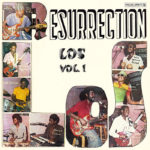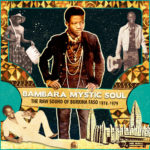(via Analog Africa)
Analog Africa is a label based in Überlingen, Germany that specializes in sharing tropical dance music from Africa. This year marks the label’s 10th anniversary, so I’ve been going through many of the old releases and discovering a bunch of great music. Read here to learn more about the label’s impressive history.
So far, my favorite Analog Africa release is 2011’s ‘Bambara Mystic Soul – The Raw Sound Of Burkina Faso 1974 – 1979.’
From the Bandcamp bio:
“For its commemorative 10th release, Analog Africa indulges in Burkina Faso, one of the jewels of the Sahel, a harsh and arid strip that straddles the southern Sahara, stretching from Dakar in the west to Djibouti in the east. Formerly known as Haute Volta, Burkina Faso’s sound was organized and nurtured during the country’s time as part of a vast patchwork making up French colonial West Africa.
The rise of a post-independence urban middle class willing to invest in the Burkinabe arts spawned a cadre of singers, bands, orchestras and, most importantly, competitive record labels who all played their part in ushering in a golden age of music in their landlocked nation during the 1970’s – a decade marred by political instability in the country and an era of artistic enlightenment empowering the whole of Africa.
The Sahelian climate fortunately bore no influence on the Burkinabé sound, which is cosmopolitan as it was raw. West Africa was and continues to remain deeply interconnected. In search of better gigs, well-to-do producers and sufficient recording equipment, Burkinabe musicians ventured across the surrounding region, returning home with a wealth of knowledge of their neighbors’ distinctive styles.
The raw sound of Burkina Faso combined Afro-Funk, traditional Islamic rhythms and subtle Afro-Latin sounds brought over by visiting Cuban ensembles. Mandingue melodies and guitar techniques from Mali and Guinea, however, were by far the most defining traits of a potent African mix that distinguished the Voltaic style between 1974 and 1979.”
Analog Africa:
SoundCloud
Facebook
Twitter
Website

